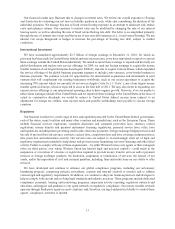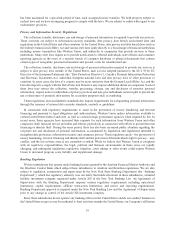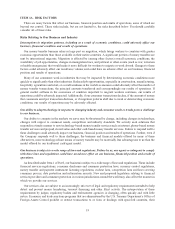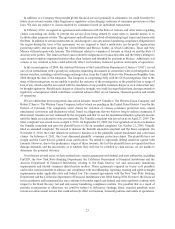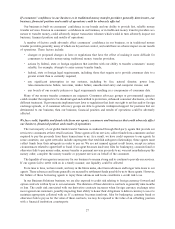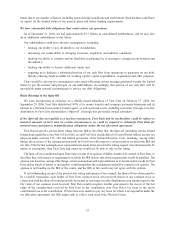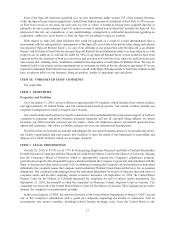Western Union 2010 Annual Report Download - page 25
Download and view the complete annual report
Please find page 25 of the 2010 Western Union annual report below. You can navigate through the pages in the report by either clicking on the pages listed below, or by using the keyword search tool below to find specific information within the annual report.Risks associated with operations outside the United States and foreign currencies could adversely affect our
business, financial position and results of operations.
An increasing portion of our revenue is generated in currencies other than the United States dollar. As a result, we
are subject to risks associated with changes in the value of our revenues denominated in foreign currencies. Our
Business Solutions business provides currency conversion and foreign exchange hedging services to its customers,
further exposing us to foreign currency exchange risk. In order to mitigate these risks, we enter into derivative
contracts. However, these contracts do not eliminate all of the risks related to fluctuating foreign currency rates.
Our foreign exchange risk and associated foreign exchange risk management is greater in our Business Solutions
business due to the nature of this business. The significant majority of Business Solutions’ revenue is from
exchanges of currency at the spot rate enabling customers to make cross-currency payments. This business also
writes foreign currency forward and option contracts for our customers. The duration of these derivatives contracts
is generally nine months or less. Business Solutions aggregates its foreign exchange exposures arising from
customer contracts, including the derivative contracts described above, and hedges the resulting net currency risks
by entering into offsetting contracts with established financial institution counterparties. If we are unable to obtain
offsetting positions, our business, financial position and results of operations could be adversely affected.
A significant portion of our revenue is generated outside of the United States and much of the cash and cash
equivalents from this business are held by our foreign entities. Repatriating these funds to the United States would,
in many cases, result in significant tax obligations because most of these funds have been taxed at foreign tax rates
that are relatively low compared to our combined federal and state tax rates in the United States. If repatriation of
these funds is required or if a change in legislation requires a different tax treatment, our business, financial position
and results of operations could be adversely impacted. For further discussion regarding the risk that our future
effective tax rates could be adversely impacted by changes in tax laws, both domestically and internationally, see
risk factor “Changes in tax laws and unfavorable resolution of tax contingencies could adversely affect our tax
expense” below.
Money transfers and payments to, from or within or between countries may be limited or prohibited by law. At
times in the past, we have been required to cease operations in particular countries due to political uncertainties or
government restrictions imposed by foreign governments or the United States. Occasionally agents have been
required by their regulators to cease offering our services. Additionally, economic or political instability or natural
disasters may make money transfers to, from or within a particular country difficult, such as when banks are closed,
when currency devaluation makes exchange rates difficult to manage or when natural disasters or civil unrest makes
access to agent locations unsafe. These risks could negatively impact our ability to make payments to or receive
payments from international agents or our subsidiaries or our ability to recoup funds that have been advanced to
international agents or are held by our subsidiaries and could adversely affect our business, financial position and
results of operations. In addition, the general state of telecommunications and infrastructure in some lesser
developed countries, including countries where we have a large number of transactions, creates operational risks for
us and our agents that generally are not present in our operations in the United States and other more developed
countries.
Many of our agents outside the United States are post offices, which are usually owned and operated by national
governments. These governments may decide to change the terms under which they allow post offices to offer
remittances and other financial services. For example, governments may decide to separate financial service
operations from postal operations, or mandate the creation or privatization of a “post bank” or they may require
multiple service providers in their network. These changes could have an adverse effect on our ability to distribute,
offer or price our services in countries that are material to our business.
Changes in tax laws and unfavorable resolution of tax contingencies could adversely affect our tax expense.
Our future effective tax rates could be adversely affected by changes in tax laws, both domestically and
internationally. From time to time, the United States Congress and foreign, state and local governments consider
legislation that could increase our effective tax rates. If changes to applicable tax laws are enacted, our results of
operations could be negatively impacted.
23


